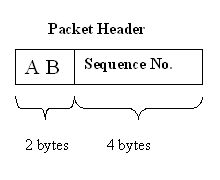#include "common.h"
#include <iostream>
using namespace std;
class Packet;
class Port;
class Address;
class SendingPort;
int main(int argc, const char * argv[])
{
try {
const char* hname = "localhost";
Address * my_addr = new Address(hname, 3000);
Address * dst_addr = new Address(argv[1], (short)(atoi(argv[2])));
SendingPort *my_port = new SendingPort();
my_port->setAddress(my_addr);
my_port->setRemoteAddress(dst_addr);
my_port->init();
Packet * my_packet;
for (int i=0; i< 30; i++)
{
my_packet = new Packet();
my_packet->setPayloadSize(100);
PacketHdr *hdr = my_packet->accessHeader();
hdr->setOctet('A',0);
hdr->setOctet('B',1);
hdr->setIntegerInfo(i,2);
//hdr->setSize(6);
my_port->sendPacket(my_packet);
cout << "packet "<< i << " is sent!" <<endl;
delete my_packet;
sleep(1);
}
} catch (const char *reason ) {
cerr << "Exception:" << reason << endl;
exit(-1);
}
return 0;
}
|
#include "common.h"
#include <iostream>
using namespace std;
class Packet;
class Port;
class Address;
class ReceiverPort;
int main(int argc, const char * argv[])
{
try {
const char* hname = "localhost";
Address * my_addr = new Address(hname, (short)(atoi(argv[1])));
ReceivingPort *my_port = new ReceivingPort();
my_port->setAddress(my_addr);
my_port->init();
cout << "begin receiving..." <<endl;
Packet *p;
while (1)
{
p = my_port->receivePacket();
/**
* Post-processing received packet
*/
if (p !=NULL)
cout << "receiving a packet of seq num " << p->accessHeader()->getIntegerInfo(2) << endl;
}
} catch (const char *reason ) {
cerr << "Exception:" << reason << endl;
exit(-1);
}
return 0;
}
|
